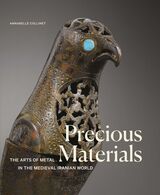
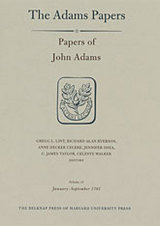
In mid-March 1781, John Adams received his commission and instructions as minister to the Netherlands and embarked on the boldest initiative of his diplomatic career. Disappointed by the lack of interest shown by Dutch investors in his efforts to raise a loan for the United States, Adams changed his tactics, and in a memorial made a forthright appeal to the States General of the Netherlands for immediate recognition of the United States. Published in Dutch, English, and French, it offered all of Europe a radical vision of the ordinary citizen’s role in determining political events. In this volume, for the first time, the circumstances and reasoning behind Adams’s bold moves in the spring of 1781 are presented in full.
In July the French court summoned Adams, the only American in Europe empowered to negotiate an Anglo–American peace, to Paris for consultations regarding an offer made by Austria and Russia to mediate the Anglo–French war. In his correspondence with France’s foreign minister, the Comte de Vergennes, Adams passionately insisted that the United States was fully and unambiguously independent and sovereign and must be recognized as such by Great Britain before any negotiations took place. This volume shows John Adams to be a determined and resourceful diplomat, unafraid to go beyond the bounds of traditional diplomacy to implement his vision of American foreign policy.
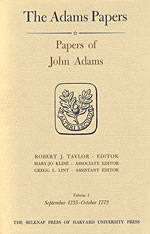
No family in three generations has contributed so much to American history as the Adamses. John Adams, John Quincy Adams, and Charles Francis Adams, despite periods of doubt, knew that history, if not their contemporaries, would recognize their accomplishments. When the Adams Papers series is complete, the writings of these three statesmen will have been examined thoroughly.
Aside from the Legal Papers of John Adams, published in 1965, these two volumes are the first in Series III: General Correspondence and Other Papers of the Adams Statesmen. Volumes 1 and 2 of the Papers of John Adams include letters to and from friends and colleagues, reports of committees on which he served, his polemical writings, published and unpublished, and state papers to which he made a contribution.
All of Adams’s newspaper writings, including “A Dissertation on the Canon and the Feudal Law,” are in these two volumes. In addition to being a condemnation of the Stamp Act, the “Dissertation” is shown to be one of the building blocks of the theory of a commonwealth of independent states under the king, which reaches complete statement in the Novanglus letters. For the first time, all thirteen of these letters appear in full with annotation.
The period September 1755 to April 1775 covers Adams’s public service in Braintree and Boston town meetings, the Massachusetts House of Representatives, the First Continental Congress, and the First Provincial Congress of Massachusetts. During this time his political future was being shaped by circumstances not always of his choosing. He hesitated at first at the threshold of a public career, political ambition in conflict with concern for his family’s well-being. But as the confrontation with Great Britain sharpened, the crisis became acute; no choice remained. For Adams there was no shirking the path of duty.
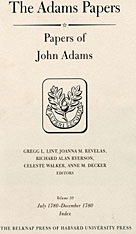
On the last day of December 1780, John Adams wrote that he had just spent “the most anxious and mortifying Year of my whole Life.” He had resided first at Paris, then at Amsterdam, attempting, without success, to open Anglo–American peace negotiations and to raise a Dutch loan. In volumes 9 and 10 of the Papers of John Adams, over 600 letters and documents that Adams sent to and received from numerous correspondents in Europe and America provide an unparalleled view of Adams’s diplomacy and a wealth of detail on the world in which he lived.
These volumes chronicle Adams’s efforts to convince the British people and their leaders that Britain’s economic survival demanded an immediate peace; his “snarling growling” debate with the French foreign minister, the Comte de Vergennes, over the proper Franco–American relationship; and his struggle to obtain a loan in the Netherlands, where policies were dictated by Mammon rather than republican virtue. Adams’s writings, diplomatic dispatches, and personal correspondence all make clear the scope of his intelligence gathering and his propaganda efforts in the British, French, and Dutch press. The letters reflect his interest in Bordeaux wines, the fate of Massachusetts Constitution that he had drafted in 1779, and political developments in Philadelphia, Boston, London, and St. Petersburg. The volumes leave no doubt as to John Adams’s unwavering commitment to the American cause. Even in this most difficult year, he believed the revolution in America to be “the greatest that ever took Place among Men.” He felt honored to serve a new nation where “the Wisdom and not the Man is attended to,” whose citizens were fighting a “People’s War” from which the United States would inevitably emerge victorious to take its rightful place on the world stage.
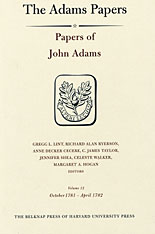
The American victory at Yorktown in October 1781 and the fall of Lord North’s ministry in March 1782 opened the possibility that John Adams might soon be involved in negotiations to end the war for American independence. To prepare for the occasion, Adams and Benjamin Franklin discussed in their letters the fundamentals for peace. Adams made it clear to the British government that there would be no negotiations without British recognition of the United States as independent and sovereign.
This volume chronicles Adams’s efforts, against great odds, to achieve formal recognition of the new United States. The documents include his vigorous response to criticism of his seemingly unorthodox methods by those who would have preferred that he pursue a different course, including Congress’s newly appointed secretary for foreign affairs, Robert R. Livingston.
In April 1782 the Netherlands recognized the United States and admitted John Adams as its minister. For Adams it was “the most Signal Epocha, in the History of a Century,” and he would forever see it as the foremost achievement of his diplomatic career. The volume ends with Adams, at long last a full-fledged member of the diplomatic corps, describing his reception by the States General and his audiences with the Prince and Princess of Orange.
READERS
Browse our collection.
PUBLISHERS
See BiblioVault's publisher services.
STUDENT SERVICES
Files for college accessibility offices.
UChicago Accessibility Resources
home | accessibility | search | about | contact us
BiblioVault ® 2001 - 2024
The University of Chicago Press




